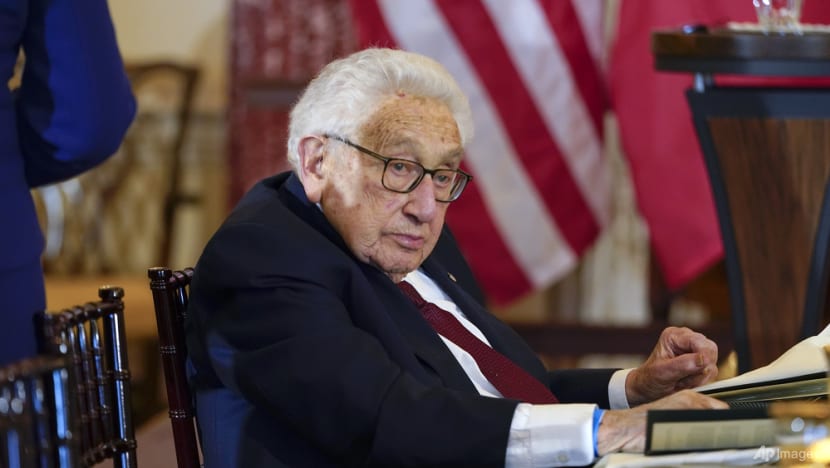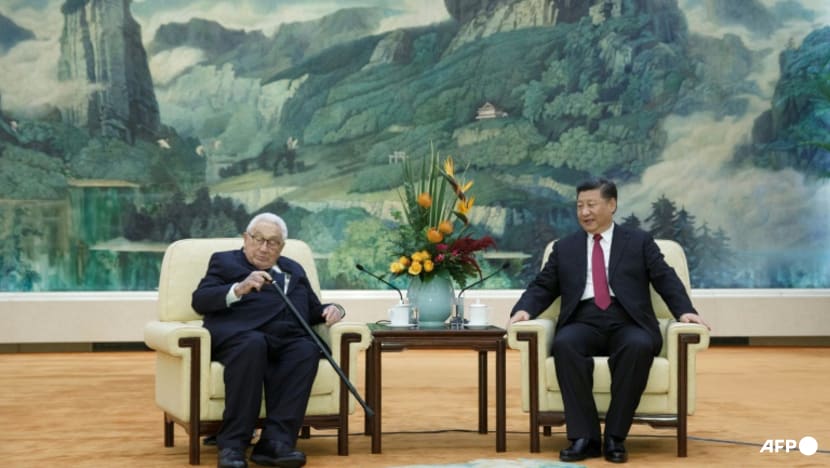Commentary: How will Henry Kissinger be remembered in Southeast Asia?
Former US secretary of state Henry Kissinger was a flawed man, but his impact on Southeast Asia, especially during the region’s formative post-colonial years, is indisputable, says NTU’s Joseph Chinyong Liow.

This audio is AI-generated.
SINGAPORE: Henry Kissinger, who died on Wednesday (Nov 29) at age 100, was one of the great thinkers and practitioners of foreign policy of our time. He was also one of the most controversial.
In his lifetime, the US statesman cut a divisive figure. A giant of international diplomacy, he was celebrated by many for deep geopolitical acumen that guided United States foreign policy during the 1970s, culminating in the normalisation of ties with China and stabilisation of Arab-Israeli relations.
At the same time, he was also denounced by many others for being the architect of policies responsible for gross violations of human rights.
Why are views of Dr Kissinger so polarised, and how will he be remembered in Southeast Asia?
HENRY KISSINGER’S WORLDVIEW
In trying to understand the enigma of the man, we have to understand his worldview. Dr Kissinger was the ultimate practitioner of realpolitik pragmatism. For him, morality had little place in the arena of world politics where power served as its prime currency.
If anything, excessive preoccupation with moral arguments were a distraction from – if not an obstacle to – the larger objective of peace, which to him was ultimately about avoiding the kind of great power conflagration that brought about World War II. To achieve this objective, difficult decisions would have to be made which, to Dr Kissinger, left little room for sentimentality.
This leads to a second point: To Dr Kissinger, the chief actors in the script of global politics were the great powers. Throughout his time in office during the terms of US presidents Richard M Nixon and Gerald R Ford, Dr Kissinger was consumed by Cold War competition with the Soviet Union and principally, the question of how to prevent a major nuclear conflict without compromising American interests and security.
It is from this prism that some of the US’ most controversial policies during those years, many attributed to him and that have tainted his legacy, should be viewed, such as the toleration of right-wing dictatorships in Latin America, complicity in violence in Bangladesh and the bombing of Cambodia.
KISSINGER’s IMPACT ON SOUTHEAST ASIA
With these aspects of Dr Kissinger’s worldview in mind, what were his contributions and connections to Southeast Asia? After all, if indeed his preoccupation was with great power politics, how did he view a region that comprised small and medium-sized states?
As national security adviser and later also secretary of state to US presidents Nixon and Ford, Henry Kissinger served during the most turbulent years of recent Southeast Asian history, when Soviet and Chinese-supported communist movements threatened to take over many governments in the region.
While communist insurgencies raged across Southeast Asia, it was in Vietnam where the threat was most urgent. Indeed, as early on as the presidency of Dwight D Eisenhower, the US was already seized by the prospect that the fall of Indochina to communism would allow the ideology to spread across Southeast Asia. This became known as the “domino theory”.
Dr Kissinger was instrumental in crafting and executing American policy at the height of the Vietnam War. He would oversee further escalation of the war, both in terms of the number of US troops deployed and also the expansion of the war to Cambodia, which he thought necessary in order to weaken the Vietcong.
Nevertheless, the ballooning cost of the war, mounting American casualties, and President Nixon’s promise to scale down US involvement, compelled Dr Kissinger to pursue secret negotiations with North Vietnam for the US’ eventual withdrawal.
Both he and his North Vietnamese counterpart, Le Duc Tho, were awarded the 1973 Nobel peace prize for their efforts. Mr Tho declined it, and Dr Kissinger never went to Oslo to collect his for fear of widespread protests given how unpopular the war had become.
RAPPROCHEMENT WITH CHINA
While the Vietnam War was Dr Kissinger’s most immediate challenge in Asia, it was his role in the rapprochement with China that proved, in a sense, his crowning achievement. In July 1971, Dr Kissinger made a secret trip to Beijing to pave the way for Richard Nixon’s monumental visit in February the following year.
The trip sowed the seeds for eventual normalisation of bilateral ties and creation of what Dr Kissinger himself called a “tacit alliance”, in turn occasioning a major shift on the geopolitical chessboard with enduring consequences for Southeast Asia.
The normalisation of ties established the necessary conditions for Chinese leader Deng Xiaoping to consolidate power, ease China away from the tumultuous years of Maoist radicalism, and set the country on the path to reform and economic liberalisation.
It should be no surprise then, that China mourns the passing of Dr Kissinger not only as that of an “old friend,” but also for how he reminds them of a better, more hopeful era in the bilateral relationship with the US.

CONNECTION WITH LEE KUAN YEW
Finally, in terms of Dr Kissinger’s connections with Southeast Asia, something has to be said of his personal relationship with Lee Kuan Yew. The relationship between the two men is well known and documented. Both not only shared a healthy respect for each other, in a sense, they were intellectual “soulmates” who shared very similar readings of and approaches to global affairs.
As Dr Kissinger wrote in his eulogy to Singapore’s founding prime minister when he passed: “Lee Kuan Yew was a great man. And he was a close personal friend, a fact that I consider one of the great blessings of my life. A world needing to distill order from incipient chaos will miss his leadership.”
From the flood of obituaries and reflections since his passing, it is clear that in the court of public opinion, Henry Kissinger’s hard-nosed, amoral and pragmatic approach to international affairs will continue to be the subject of debate for some time to come.
He was, without doubt, a flawed man, capable of brilliance but also mistakes. Nevertheless, his impact on Southeast Asia, especially during the region’s formative post-colonial years, is indisputable. In many ways, his influence still reverberates today, and it will undoubtedly live on.
Joseph Chinyong Liow is Dean of College of Humanities, Arts and Social Sciences at Nanyang Technological University, Singapore.








